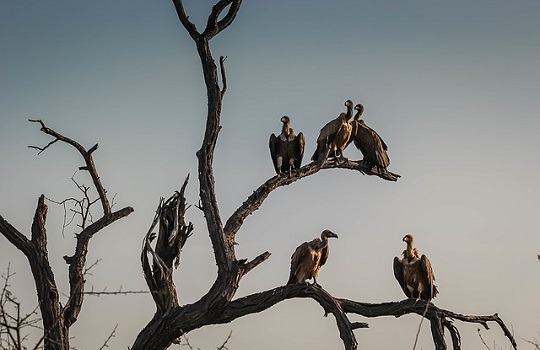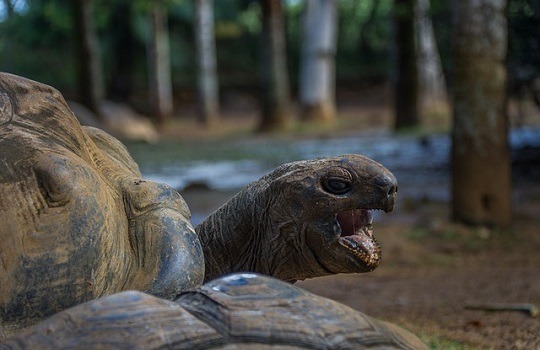Link To The Wild
Our global conservation projects
‘Link to the Wild’ supports in-country conservation across the globe. The projects are chosen and supported by our keepers here at Blair Drummond, and are often smaller grass-root initiatives.
Since 2014 we’ve raised over £242k for conservation projects. This money has been paid directly to the charities involved, often funding key salaries or paying for essential equipment.
Read on to find out more about some of the projects we’ve funded. If you’d like to help us support the vital work undertaken by these projects, you can donate via the button below.
Chimp-friendly crops in Uganda

Chimpanzees are becoming increasingly rare in the forest regions of Africa. Deforestation means that much of their habitat is disappearing. The Bulindi Chimpanzee & Community Project works with local communities, teaching them to raise tree seedlings and grow chimp-friendly crops – ensuring that humans and chimpanzees can co-exist happily.
£62,750 donated since 2014
Rehabilitating vultures in South Africa

You may not know, but vultures are now the most threatened bird species in the world. Many birds are hunted and poisoned by pesticides and lead fragments from bullets, injured by electricity cables or hit by cars when feeding on road-kill. We work with South African charity VulPro to protect, rehabilitate and re-release vultures into the wild.
£41,980 donated since 2014
Fighting the pet trade in macaques

Barbary macaques are now endangered and are still frequently sold as pets and performers, and to provide tourists with photo opportunities. We work with Barbary Macaque Awareness and Conservation (BMAC) to highlight this issue within local communities and show how destructive the “photo prop” trade can be.
£17,100 donated since 2014
Lemurs and livelihoods in Madagascar

Madagascar holds 5% of the world’s plant and animals species, but deforestation is a constant threat and most lemur species on the island are now critically endangered. We work with Feedback Madagascar to educate local communities, help them plant their own trees and adopt eco-friendly, sustainable methods of farming.
£15,950 donated since 2014
Protecting wild lions in Namibia

Now considered vulnerable to extinction, the lions in Etosha National Park in Namibia are frequently coming into conflict with humans. We work with AfriCat UK to help the Namibian Lion Trust track the location of specific lions and protect them from poaching.
£9,450 donated since 2018
All-Woman Wildlife Protection

South Africa’s 150,000-acre Balule Nature Reserve is a prime target both for local bushmeat hunters and organised poaching gangs. Since the Black Mambas were formed in 2013 to safeguard this area, bush meat poaching has been reduced by 89% and poaching incursions have been reduced by 88%.
By helping to pay for salaries and equipment, we can further empower these brave women to protect wildlife both day and night.
£3,700 donated since 2022
Supporting ocean conservation

Galapagos Conservation Trust (GCT) is the only UK registered charity to focus solely on the conservation of the Galapagos Islands.
By raising funds and awareness in the UK, we helped GCT to support and deliver projects in Galapagos and respond to key threats facing the Islands. GCT focuses on restoring natural habitat, protecting threatened species and driving sustainable solutions.
£4,100 donated 2022-2024
Habitat restoration in India

In the Kanha Reserve in India, Bengal Tiger numbers have suffered rapid decline due to habitat loss, hunting and human-wildlife conflict caused by tigers being forced into closer proximity with humans.
One specific problem is the proliferation of invasive plant species. The growth of these invasive species impedes the growth of the native species that are essential food sources for the wild herbivores that the tigers prey on. By helping The Corbett Foundation to remove these invasive species, we helped reduce human-wildlife conflict.
£12,200 donated 2017-2024
Protecting rhinos from poaching

More than 7,000 rhinos have been poached in the last decade. The number poached in South Africa alone has risen by 9000% in the last twelve years and is a huge and very real threat to wild rhino populations.
Working with OSCAP (Outraged SA Citizens Against Poaching), we’ve been able to provide essential equipment to game rangers working on ground level to protect rhinos. The charity also works to monitor wild rhino movements and rescue rhino calves left orphaned by illegal poaching.
£15,650 donated 2014 – 2022
Restoring the White-tailed Eagle

Once a big part of Welsh biodiversity, culture and heritage, the White-tailed eagle unfortunately became extinct in Wales in the early 19th century. Research has since shown that these eagles are an essential missing component of the marine and freshwater ecosystems in Wales.
Working with the Durrell Wildlife Trust, we helped them to plan and initiate the reintroduction of White-tailed eagles across the Severn Estuary, with the overall aim of establishing a viable breeding population and building ecosystem resilience through the restoration of their key functions.
£250 in 2022
Rescuing Scotland’s marine mammals

Working with the Cetacean Research and Rescue Unit (CRRU) we helped to fund equipment which allows for the quick and efficient rescue of stranded or trapped marine mammals around Scotland’s coastline, including whales, dolphins, porpoises and seals.
£7,850 donated 2017 – 2019
Giraffe conservation in Uganda

Many people are unaware that giraffes are currently much more endangered than African elephants. We worked with the Giraffe Conservation Foundation to help fund the protection, and translocation, of vulnerable giraffe populations in Uganda.
£9,500 donated 2016 – 2021
Tagging tortoises in Mauritius

Wild giant tortoises perform a vital role in Mauritius, acting as grazers, browsers and seed dispensers, and helping to regenerate many unique plant and tree species. But historic over-hunting and the illegal pet trade have seen numbers dwindle. We worked with the Mauritian Wildlife Foundation to tag and monitor the endangered wild tortoise population.
£3,000 donated 2017 – 2019
Protecting the Monk Seal

The Mediterranean Monk Seal is Europe’s most endangered marine mammal. Working with the Hellenic Society for the Study and Protection of the Monk Seal (MOm), we helped to create a new marine protection area around the Greek island of Gyaros.
£4,500 donated 2014 – 2021
Tracking Raptors in Scotland (by phone!)

Because it’s so reclusive, the Goshawk is one of the least studied raptor species in the UK. In 2016, we were part of a cutting-edge new study, tracking the movements of wild goshawks using the ‘Movetec’ bird tracking system, which can connect to a mobile phone!
Working with the Scottish Raptor Study Group (SRSG) we followed a number of juveniles to adulthood and subsequently tagged their offspring.
£9,550 donated 2016 – 2019
